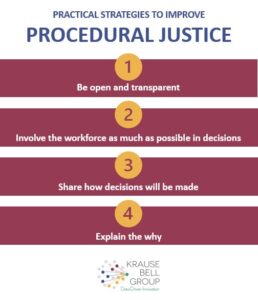September 16, 2025
No Justice, No Peace: Fairness as the Foundation of a Safe Work Environment
How Procedural Justice Helps Build Culture
A boss who plays favorites so you must ‘kiss up’ simply to be recognized. A boss who has no idea what you do or how well you do it. You see a poorly performing colleague get promoted because he’s the boss’s fishing buddy. We’ve all been here. What did it feel like? How hard did you work to meet team goals? How quickly were you looking for the exit?
A world without justice or fairness causes several issues in our world, but especially in the workplace. Specifically, supervisors are the bridge between leadership and the front line, therefore their influence on communication, trust, and decision-making makes them pivotal to safety culture.
Defining Procedural Justice
There are different kinds of justice, but we’re just going to talk about the most impactful – Procedural Justice. Procedural Justice describes the extent to which the process used to achieve outcomes or make decisions is perceived by the workforce to be fair.
Imagine you’re on a team of 6 people and your immediate supervisor just got promoted to the manager role, leaving the supervisor role vacant. The new manager must now choose one of your 6 teammates to be promoted to supervisor. The process the manager uses and the extent to which it’s perceived to be fair will go a long way toward the future culture of your team. If the manager chooses Joe because they golf together and no one else gets a chance, how do you think you’ll feel about that process? Especially if you and your colleagues know Joe to be only an average worker?
Now imagine a different scenario. One in which the manager describes the process and criteria for promoting the next supervisor, which everyone has an opportunity to apply for. You and your teammates are all interviewed. It’s a tough interview, and the committee asks specific questions about your past performance, projects you’ve been on, and skills you’ve demonstrated that relate to the supervisor job. Even though you don’t get the job, you feel like you’ve put your best foot forward and Carol, the person they do select, is known to be a smart and helpful teammate. How would you feel about the promotion decision in this scenario, and about Carol as your new boss?
Applying Procedural Justice to Decision Making
Done well, a procedurally just process can have a tremendous impact on the team, even with the people who weren’t chosen to be supervisor. To build a procedurally just work environment, there are actions leaders need to take before making a decision, as well as actions to take after the decision is made.
Before a decision is made, leaders should:
- Collect accurate information from multiple sources
- Seek and listen to the concerns of employees, especially if the decision will affect them
- Consider their own biases and how the decision process will be perceived
After a decision is made, leaders should:
- Clarify the rationale for the decision (the ‘why’)
- Apply the decision consistently across people and time
- Allow those affected an option to appeal the decision and provide additional context/information
Procedural Justice applies to any decision being made about work and not just safety-specific decisions. Decisions about how teams are configured, who does what task or shift assignments, who goes on break and when, and even decisions about how to solve work problems.
The Benefits of Procedural Justice and Fairness
When employees believe that rules are applied consistently, transparently, and with input from all affected, they are more likely to follow safety procedures. They are also more likely to report hazards, near misses, and unsafe conditions.
Perceptions of Procedural Justice have numerous positive effects on what workers do and how they act in the workplace. Research over the past 40+ years has demonstrated that when you’re able to improve procedural justice, there is also an increase in the following:
- Work and Team Performance
- Customer Service Satisfaction
- Trust in the Supervisor
- Trust in the Organization
- Job Satisfaction
- Organizational Commitment
- Citizenship Behaviors (helping others, volunteering, discretionary effort, etc.)
And when you improve Procedural Justice, you get fewer negative outcomes:
- Withdrawal behaviors (absenteeism, lateness, disengagement, etc.)
- Counterproductive Work Behaviors (theft, conflict, rumor mongering, etc.)
- Intent to Quit the organization if there was a similar job with the same pay available
- Burnout
What can I do as a Leader?
Practical Strategies to Improve Procedural Justice
- Be open and transparent. Share both the good and the bad news. Believe it or not, people can tell if you’re hiding something. Openness spurs more trust, even if all you can do is tell them you can’t say anything, provided you commit to telling them as soon as you’re able.
- Involve the workforce as much as possible in decisions. Most employees recognize they’re not going to have a say in some decisions, but the more it affects them and their work, the more involved you want them to be.
- Share how decisions will be made. Be clear about how a decision will be made, the extent of involvement they will have, and the rationale for choosing that decision mode.
Explain the why. Our curious human nature calls us to want to know the rationale behind decisions or actions, especially if we’re being asked to do something different. Explaining the why is also a sign of respect

Conclusion
When you observe young children playing with others, one of the first things you’ll hear when there is conflict is “that’s not fair.” From an early age, we have an ingrained sensitivity to and remarkably accurate perception of fairness that does not go away as we get older. In fact, we become even more attuned to our environment.
Building procedural justice into your work culture is one of the most critical things you can do to improve the performance, morale, and safety of your team. The Krause Bell Group Culture Survey provides actionable insights into how well leaders and organizations apply Procedural Justice, as well as four other scales that are scientifically proven to drive improvements in safety and culture.
More information about Procedural Justice is available on this webinar or if you would like to talk to a Krause Bell Group Executive Consultant about improving the culture in your organization, request a consultation


